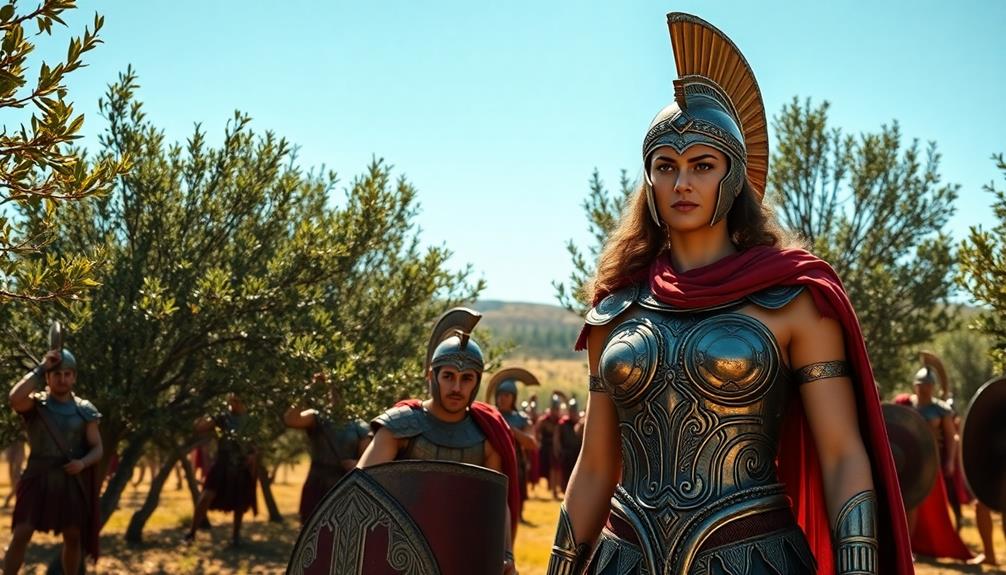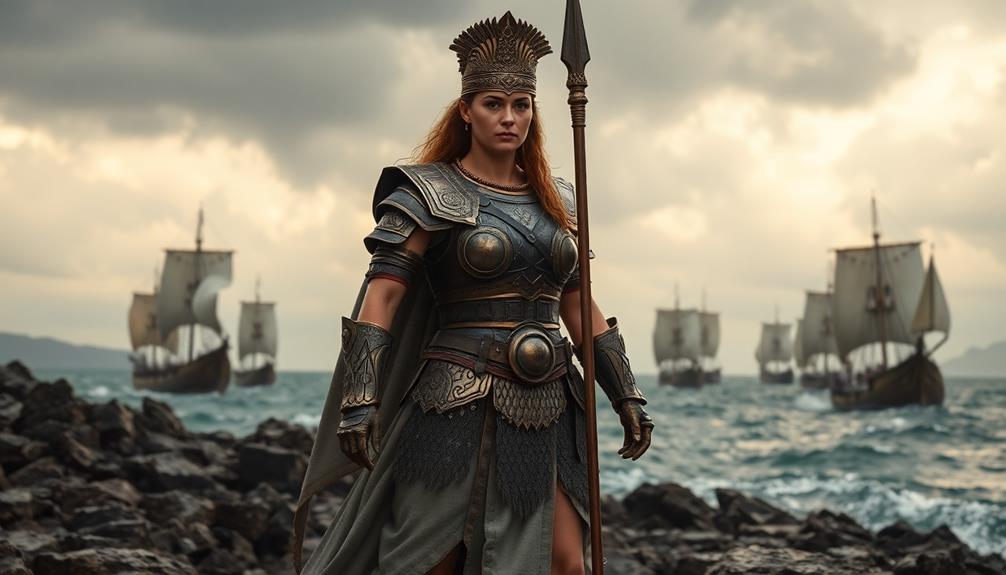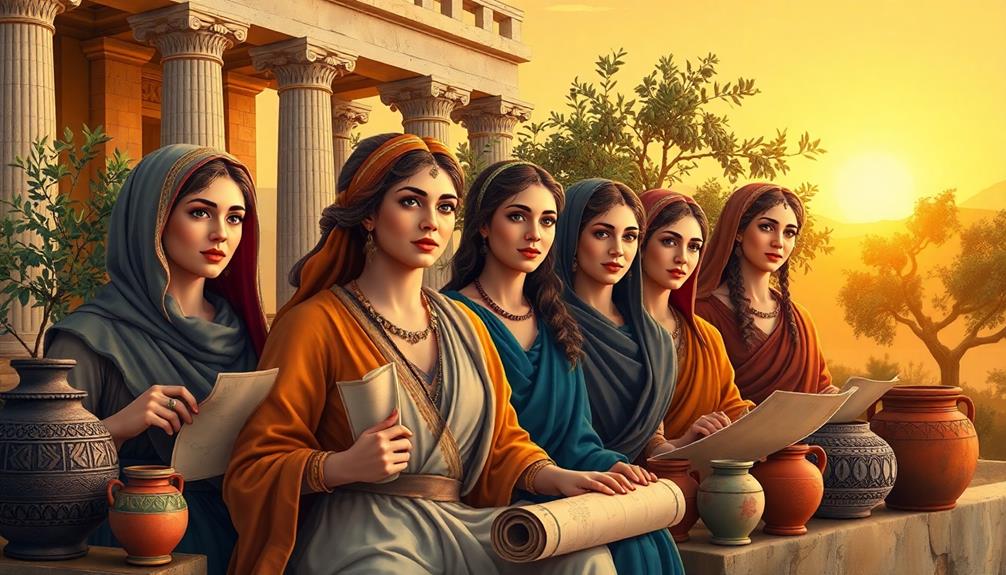You might think of Sappho or Aspasia, but there are several influential women in ancient Greece you've likely never heard of. Gorgo, the Spartan queen, showcased political strength, while Artemisia I defied norms as a naval commander. Agnodice broke barriers as the first female doctor, and Telesilla led a successful defense against invaders. Anyte captured human experience through her poetry, and Olympias leveraged her power to secure Alexander's throne. These women shaped their society in remarkable ways, offering a unique perspective on female strength in a male-dominated world. Stick around to discover more about their incredible legacies.
Key Takeaways
- Sappho, a pioneering poet from Lesbos, created significant lyric poetry that preserved women's voices and emotions in ancient Greece.
- Aspasia, a political influencer and hetaera, shaped Athenian democracy and faced societal backlash for her role in public discourse.
- Gorgo, a Spartan queen, displayed political acumen and bravery, advising her husband King Leonidas during critical battles.
- Artemisia I challenged gender norms as a naval commander, playing a key role in the Battle of Salamis during the Persian Wars.
- Agnodice, the first female doctor, broke societal barriers in medicine, paving the way for future women in healthcare.
The Role of Women in Ancient Greece

In ancient Greece, the role of women was largely defined by domesticity and subservience. Women in ancient Greece, especially Athenian women, were primarily confined to domestic roles, managing the household and producing male heirs. Their legal rights were minimal; they couldn't vote, engage in politics, or own property independently.
While Spartan women enjoyed greater autonomy, most Athenian women faced strict societal norms. Education for women was limited, focusing mainly on domestic skills, with literacy rates remaining low. However, elite daughters sometimes received private tutoring.
Public participation was rare, but some influential women, like Aspasia and Hypatia, broke through these barriers. They leveraged their talents and family connections to challenge societal norms, thereby gaining recognition.
Despite the constraints of a patriarchal society, women like Sappho and Anyte made significant literary contributions. Their works offer valuable insights into their experiences and perspectives, shedding light on the complexities of life for women in ancient Greece.
Sappho: Trailblazing Poet

Amid the constraints faced by women in ancient Greece, Sappho emerged as a powerful voice through her poetry. As one of the first known female poets, she hailed from the island of Lesbos and wrote lyric poetry that explored themes of love and desire, particularly among women.
Though only fragments of her work survive, Sappho's contributions number around 10,000 lines, solidifying her status as one of the Nine Lyric Poets in Hellenistic Alexandria.
Her most famous piece, "Ode to Aphrodite," showcases her talent for vivid imagery and emotional depth, capturing the complexities of desire.
Sappho's poetry has played a vital role in preserving women's voices in literature, offering rare insights into their emotional and social lives during a time when their perspectives were often overlooked.
The terms "Sapphic" and "Lesbian" derive from her name and the island of Lesbos, underscoring the homoerotic themes that permeate her work.
In a world that sought to silence women, Sappho's lyrical expressions continue to resonate, reminding us of the power of love and the enduring strength of women's voices in ancient Greece.
Aspasia: Political Influencer

When you think about influential figures in Athenian politics, Aspasia of Miletus stands out due to her close relationship with Pericles.
Her role as a hetaera allowed her to engage in essential public discussions, directly impacting his decisions during a pivotal time.
Despite facing societal challenges, her intellect and insight shaped the course of Athenian democracy.
Relationship With Pericles
Aspasia of Miletus stands out as one of the most influential figures in ancient Athens, primarily due to her relationship with the statesman Pericles. As an educated hetaera, you'd see her engaging in Athenian political life, which was quite rare for women of her time. This relationship not only challenged societal norms but also shaped significant political decisions during Pericles' administration.
Together, they'd a son named Pericles the Younger, further intertwining their lives and legacies. Aspasia was known for her intelligence and eloquence, earning respect from notable philosophers like Socrates, who acknowledged her contributions.
However, you'd also notice that her influence didn't come without backlash; many blamed her for Athens' military strategies during the Peloponnesian War, reflecting the societal tension surrounding her status.
Despite these challenges, Aspasia's role as a political influencer in Pericles' life was undeniable. Her ability to navigate the complexities of Athenian society allowed her to leave a lasting impact, making her one of the key figures behind the scenes of Athenian politics during a transformative period.
Influence on Athenian Politics
The impact of Aspasia on Athenian politics extended far beyond her relationship with Pericles. As a highly educated woman in a male-dominated society, she navigated the political landscape with remarkable influence. Her role as a hetaera allowed her to engage in public life, providing Pericles with invaluable intellectual companionship that shaped his decisions during a transformative time in Athens.
- She was blamed for military actions, highlighting societal hostility toward her influence.
- Notable philosophers, including Socrates, recognized her eloquence and intelligence.
- Aspasia faced numerous controversies, yet her voice remained prominent.
- Her legacy endures as a symbol of women's political engagement in ancient Greece.
Through these challenges, Aspasia showcased the potential of influential women in a world that often silenced them. By advocating for education and participating in political discourse, she carved out a space for women, leaving a lasting impact on Athenian politics.
Aspasia's story is a demonstration of the power of intellect and resilience against societal constraints, reminding us that history often overlooks those who dared to challenge the status quo.
Gorgo: Spartan Queen

Gorgo, the Spartan Queen, considerably shaped political life in her city-state, showcasing the rare influence women held in ancient Greece.
Unlike many of her contemporaries, she enjoyed greater autonomy, particularly in managing property and education.
Her legacy emphasizes the strength and values of Spartan society, reflecting a unique blend of intellect and courage that continues to resonate today.
Gorgo's Political Influence
In the domain of Spartan politics, few figures stand out like Gorgo, the daughter of the legendary King Leonidas I. Her political influence was unparalleled, as she uniquely embodied the intelligence and courage that defined Spartan women.
You might be surprised to learn that:
- Gorgo advised her husband, emphasizing bravery before pivotal battles.
- She actively participated in political discussions, a rarity for women of her time.
- Her insights shaped national security strategies against the Persian threat.
- Gorgo's counsel considerably impacted Spartan governance.
Gorgo's role extended beyond typical expectations; she didn't just support her husband but engaged directly in matters that determined the fate of Sparta.
By urging King Leonidas to "remember to be brave," she highlighted the importance of courage in leadership. Her ability to advise and influence decisions regarding national security showcased her commitment to the Spartan way of life.
This legacy reflects a unique aspect of Spartan women, who enjoyed greater autonomy and political engagement compared to their peers in other city-states.
Ultimately, Gorgo's intelligence and political savvy solidified her status as one of the most influential women in ancient Greece.
Spartan Women's Autonomy
Few societies in ancient Greece allowed women the level of autonomy that Spartan women enjoyed, and Gorgo stands as a prime example of this exceptional status. As the daughter of King Leonidas I, Gorgo was known for her intelligence and political acumen.
Unlike their Athenian counterparts, Spartan women had significant influence in state affairs and were often involved in discussions that shaped their society. This level of involvement mirrors the growing demand for renewable energy solutions, reflecting how women in Spartan society contributed to the crucial energy and decision-making processes of their time.
Spartan women could own property, which granted them a unique economic power within their households. This ownership allowed them to manage resources and contribute to their family's wealth. Additionally, their commitment to physical training guaranteed they were strong and resilient, further enhancing their societal power.
Gorgo's role in advising King Leonidas during the Persian Wars highlights how Spartan women weren't only participants but essential actors in political and military matters. Her famous assertion that Spartan women give birth to men who rule underscores their foundational role in sustaining Spartan society.
Legacy of Gorgo
The remarkable autonomy that Spartan women enjoyed set the stage for Gorgo's lasting legacy as a powerful figure in ancient Greece. As the daughter of King Leonidas I, she utilized her strength of character and intelligence to exert political influence, advising her husband on key state matters.
Gorgo's legacy is highlighted by her embodiment of Spartan values, including bravery and resilience.
Consider her significant contributions:
- Warned her husband about deceptive Persian messengers during the Persian Wars
- Encouraged her father with the words, "The most important thing is that you mustn't be a coward"
- Gained recognition from Herodotus as a symbol of Spartan virtue
- Inspired future generations of women in a patriarchal society
Gorgo's influence extended far beyond her lifetime, representing empowerment in a time when few women were acknowledged.
Her actions and words echo through history, showcasing a formidable woman who not only supported her husband but also shaped the political landscape of her era.
Today, Gorgo stands as a representation of the strength and bravery of women in ancient Greece, solidifying her place in history as a legendary figure.
Artemisia I: Warrior Commander

Artemisia I of Caria stands out as a formidable naval commander during the Persian Wars, especially noted for her pivotal role in the Battle of Salamis in 480 BCE. As an ally of Xerxes I, she showcased remarkable strategic acumen, earning respect from both her allies and enemies. Her military leadership broke gender norms of her time, proving that women could excel in roles traditionally reserved for men.
Here's a glimpse into her legacy:
| Aspect | Details | Significance |
|---|---|---|
| Role | Naval Commander | Pivotal in the Persian Wars |
| Notable Battle | Battle of Salamis | Demonstrated exceptional strategy |
| Historical Accounts | Documented by Herodotus | Highlighted female empowerment |
| Gender Norms | Challenged societal expectations | Set a precedent for women in leadership |
| Legacy | Symbol of female empowerment | Inspires future generations of women |
Artemisia's story is a reflection of the potential of women in military roles, and her legacy endures as an example of courage and strength in ancient history.
Anyte: Poet of Epitaphs

Following the remarkable achievements of women like Artemisia I, Anyte of Tegea emerges as a significant figure in the domain of ancient Greek poetry. As a celebrated poet of epitaphs, she explores profound themes that resonate with readers even today.
Her work, much like the role of caregivers in fostering emotional connections, reflects on mortality and the human experience, showcasing deep emotional insight and connection to nature. This connection to emotion is critical in understanding how literature can influence emotional regulation and personal growth.
Anyte's poignant verses capture the essence of life and loss, inviting you to reflect on your own experiences. Although much of her work has been lost, the surviving fragments display her masterful use of imagery, evoking strong emotional responses. Her ability to articulate the complexities of existence sets her apart in the literary canon.
In a time when women's voices were often silenced, Anyte's contributions provide invaluable insight into the thoughts and feelings of women in ancient Greece. By highlighting their experiences and societal roles, she enriches our understanding of the past and its enduring relevance to the human experience.
Olympias: Mother of Kings

Olympias' fierce determination and shrewd political instincts shaped the course of Macedonian history. As the wife of King Philip II and mother of Alexander the Great, her influence extended beyond motherhood. After Philip's assassination in 336 BC, you'd see Olympias deftly maneuvering to secure Alexander's claim to the throne, eliminating rivals, including her daughter's half-siblings.
Her ambition didn't just stop there; she was a strong supporter of the cult of Dionysus, which fortified her political power in a male-dominated society. Olympias fiercely protected Alexander, believed to be a divine figure, and her mystical practices often played into her strategies.
Here's a quick look at her life and influence:
| Aspect | Details | Impact |
|---|---|---|
| Birth | Daughter of King Neoptolemus of Epirus | Noble lineage |
| Marriage | Wife of King Philip II | Access to political power |
| Role in Alexander's Rise | Secured his claim to the throne | Eliminated rivals |
| Religious Affiliation | Supporter of the cult of Dionysus | Enhanced influence |
| Fate | Executed in 316 BC | Marked end of her power struggle |
Olympias' legacy remains a reflection of her formidable will in Macedon.
Agnodice: Pioneer in Medicine

In a society where women were often sidelined, Agnodice of Athens emerged as a groundbreaking figure in medicine. As the first female doctor in ancient Greece, she defied societal norms by disguising herself as a man to study medicine and gain access to the male-dominated field.
- Trained under the renowned anatomist Herophilus
- Developed a reputation for her skill in midwifery
- Provided essential medical care for female patients
- Faced a trial that highlighted women's rights in medicine
When her true identity was discovered, Agnodice faced accusations of seduction, but her female patients rallied to defend her. This trial was pivotal, leading to a legal precedent that allowed women to practice medicine in Athens.
Agnodice's bold actions not only challenged the restrictions placed on women in healthcare but also paved the way for future generations of female practitioners.
Her story serves as a powerful reminder of the resilience and contributions of women in ancient Greece, illuminating their significant role in advancing medicine despite the barriers they faced. Agnodice truly stands out as a pioneer whose legacy continues to inspire.
Telesilla: Defender of Argos

During the tumultuous 5th century BC, Telesilla of Argos emerged as a remarkable figure, known not only for her poetry but also for her extraordinary leadership in battle.
When the Spartan invasion threatened her city in 494/493 BC, Telesilla took on the role of a military leader, rallying the women of Argos to defend their home. She equipped them with weapons from temples, demonstrating both her ingenuity and bravery.
Telesilla's heroism was evident as she led her fellow citizens into battle, successfully inflicting heavy losses on the Spartan forces, which ultimately forced a retreat. Her contributions are documented by several ancient sources, emphasizing her importance in both literature and military history.
As a poet, she captured themes of resilience, inspiring future generations with her words.
Moreover, Telesilla challenged the traditional gender roles of her time, proving that women could excel in both the arts and warfare. Her legacy as a defender of Argos and a pioneering figure in literature highlights how she reshaped societal perceptions of women's capabilities.
Telesilla remains a reflection of the strength and versatility of women in ancient Greece.
Frequently Asked Questions
Who Was the Most Influential Greek Woman?
You might consider Aspasia of Miletus as the most influential Greek woman. Her intelligence and eloquence shaped Athenian politics, and her partnership with Pericles left a lasting impact on the city's cultural and political landscape.
Were There Any Female Leaders in Ancient Greece?
Yes, there were female leaders in ancient Greece. You'd find women like Telesilla, who rallied troops against Spartans, and Artemisia, a naval commander. Their courage and leadership defied norms, proving women could lead in tumultuous times.
Who Was the Most Beautiful Woman in Ancient Greece?
You might say Helen of Troy was the most beautiful woman in ancient Greece. Her beauty sparked the Trojan War, symbolizing desire and influencing countless works of art and literature throughout history.
What Are 3 Facts About Women in Ancient Greece?
Did you know only about 15% of women in ancient Greece received formal education? Most were confined to domestic roles, couldn't own property, and often required male guardians for legal matters, highlighting their limited societal influence.
Conclusion
Women in ancient Greece played pivotal roles that often go unrecognized. From Sappho's lyrical genius to Artemisia's fierce leadership, their contributions shaped history in profound ways. Imagine if Aspasia had access to modern social media; her insights could've sparked revolutions. By bringing these remarkable figures to light, we not only honor their legacies but also inspire future generations to challenge norms and pursue their passions, proving that women's voices have always mattered, regardless of the era.









